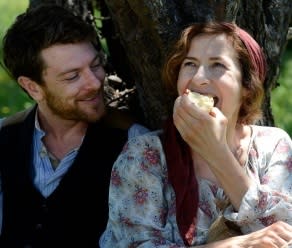WWI Love story filmed in WA
Sunday night on the ABC, once the domain of British crime series such as Midsomer Murders, has evolved recently into the home of quality Australian drama.
The competitive 8.30pm time slot has also displayed a strong local influence. WA-raised Amanda Higgs was one of the producers of the just-concluded The Time of Our Lives, while Paul Barron is the brains behind Serangoon Road, the first collaboration between ABC TV and HBO Asia, starting on September 22.
This weekend plenty of WA locations make it to the screen, albeit mostly doubling for rural France, in the telemovie An Accidental Soldier, which was filmed in Carmel, New Norcia, Moora, the old Midland Railway Workshops, the ABC studios in East Perth and Fremantle Prison.
Described as a story of love and courage behind the trenches of World War I, An Accidental Soldier follows a gentle-natured baker, Harry Lambert (Offspring and The Secret Life of Us star Dan Spielman), who is shamed by his local town into enlisting.
Harry believes as part of the Service Corps he will never see conflict but, in the dying days of the war, he finds himself facing the horror of the frontline. Not wanting to die before experiencing love, he becomes a deserter and takes refuge at the farm of Colombe Jacotot (French actress Marie Bunel), where they slowly learn to trust each other and communicate despite not speaking the same language.
Director Rachel Ward was attracted to the project because it re-evaluated, a century later, the perception of men branded cowards for not wanting to fight.
Almost 1000 British, French and Commonwealth troops, some as young as 16, were executed for desertion or cowardice during World War I.
More than 3300 Australian soldiers were court-martialled for desertion and 120 were sentenced to death but the Australian government refused to bow to pressure from the British High Command and would not impose the penalty. It was 80 years before the British and New Zealand governments pardoned the young soldiers taken away and "shot at dawn".
The telemovie was a co-production between Goalpost Pictures and Taylor Media with the assistance of ScreenWest for ABC TV.
Producer Sue Taylor enlisted set designer Clayton Jauncey early on to help convince people a story set mostly in France could be made in WA. The pair knew it could only be filmed in September and October before it got too hot and the light changed.
"On the surface you might think it's a war story but it's a love story, a love story that is set in World War I fundamentally, and that wanted a female sensibility," Taylor said of working with Ward.
Spielman said it was quite brave of the ABC to commission the unusual bilingual story.
"The character of Harry, it felt like a really interesting insight into war, to see it through the eyes of someone who is a worker and who wants to contribute to the effort but is a pacifist as well.
"The whole question of why you might desert, why you might run away and what for - to salvage what and to run to what is a really interesting question.
"The Australian military myth is a very powerful one; the notion of mateship, of camaraderie, of glory in battle has formed a big part of our psyche. And I think it is a very exclusive myth in a lot of ways and there's not a lot of room allowed by the general Australian public to see all of the contradictions and mysteries within it.
"Those things are what drew me to it."
Spielman said Ward was very hands-on during filming and had a poetic but clear style.
"You'd see her dragging branches into a frame to make it look better or planting different flowers out the front of the house so it looks more realistic," he said.
Bryan Brown has a cameo as Capt. Terence Foster, a veteran soldier assigned to Harry's case. The film and television veteran enjoyed spending time in Perth and having wife Ward direct him again.
"It's a nice story, it's a good story. It's a love story but the why of the love story and what happens are very different," he said.
"It's its own fresh story, set during the war, about how people who are affected during wartime, thrown together during the wartime experience, it's two cultures thrown together that make it fresh and different."
Although he has starred in plenty of stories dating back to the Boer War, Brown doesn't pretend to know anything about war
"You know nothing about war; war is the mental experience people go through and I guess the physical experience," he said.
"What war does to people, we who don't go to war don't know.
"How do we know what it's like to kill someone, or to have a mate killed alongside you? We don't know what it is, the emotional and traumatic effect that goes on and we are kidding ourselves if we think that. All we can do is respect them and feel for them."
'You know nothing about war; war is the mental experience people go through and I guess the physical experience.'



